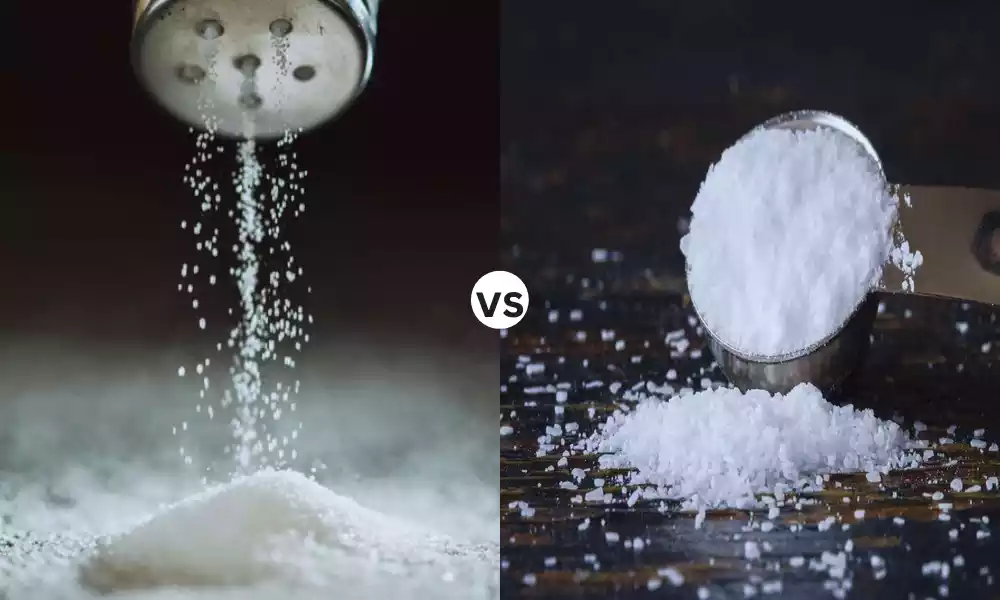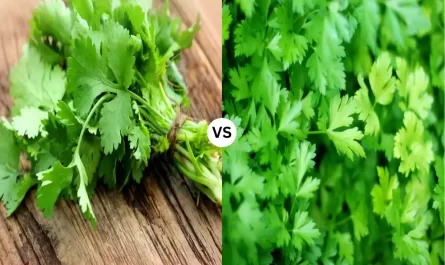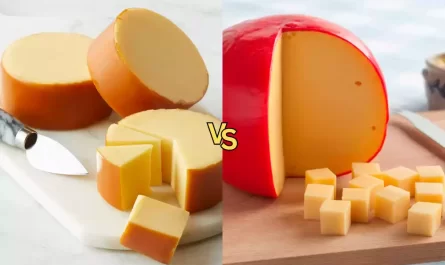Kosher salt and table salt might seem similar, but they have some important differences. Kosher salt doesn’t have any extra additives like iodine, has a grainy texture, and is mainly used for cooking. On the other hand, table salt is finer, contains iodine, and is commonly used to add flavor to food.
Despite their dissimilar appearances, both kosher salt and table salt share similar chemical compositions. Their variations lie in their texture, size, and taste.
The Significance of Kosher Salt and Table Salt
Kosher salt and table salt are two common types of salt used in cooking and food preparation. They both serve important roles in the kitchen, but they have some distinct characteristics that make them suitable for different purposes.
- Kosher Salt: This type of salt is named “kosher” not because it adheres to Jewish dietary laws (although it can be used in kosher food preparation), but because it was traditionally used in the kosher process of meats. Kosher salt has larger, flakier crystals compared to table salt, which makes it ideal for tasks like dry brining meat or seasoning food during cooking. It doesn’t contain additives like iodine, which can affect the taste of certain dishes. Many chefs prefer kosher salt for its texture and the control it offers when seasoning.
- Table Salt: Table salt is the fine-grained salt that you typically find in salt shakers and most salt containers. It’s the salt most people are familiar with. It’s been processed to remove impurities and often has iodine added to it, which is an important nutrient for our health. Table salt is great for recipes where the salt needs to dissolve quickly, like in baking or making sauces.
Why Are They Important?
- Flavor and Texture: Kosher salt’s texture and the absence of additives make it an excellent choice for many culinary applications. It can enhance the flavor and add a satisfying crunch to certain dishes, such as roasted vegetables or grilled meats. Table salt, on the other hand, is finely ground and dissolves easily, which is perfect for evenly seasoning soups, stews, and baked goods.
- Iodine Content: Table salt is often iodized, which means it’s fortified with iodine. Iodine is a vital nutrient for the body, and using iodized table salt can help ensure you’re getting enough of it. Kosher salt doesn’t contain iodine, so if you’re using kosher salt exclusively, you might need to obtain iodine from other sources in your diet.
- Versatility: Both types of salt have their place in the kitchen. The choice between kosher salt and table salt depends on the specific application. For precise measurements and quick dissolution, table salt is the go-to. If you prefer a textured salt for seasoning and enhancing the texture of your dishes, kosher salt is a great choice.
Understanding the roles and differences between kosher salt and table salt allows you to make informed choices in your cooking. Both salts are important ingredients that can elevate the taste and texture of your dishes, depending on how and where you use them.
What is Kosher salt?
Kosher salt is a type of salt that’s often used in cooking. It’s called “kosher” not because it adheres to Jewish dietary laws (although it can be used in kosher food preparation), but because of its original use in the kosher process of meats.
Kosher salt has larger, coarser grains compared to regular table salt. This makes it great for certain culinary purposes. Because of its size and texture, it can be easier to pinch and sprinkle over dishes, making it a favorite among chefs for seasoning various foods.
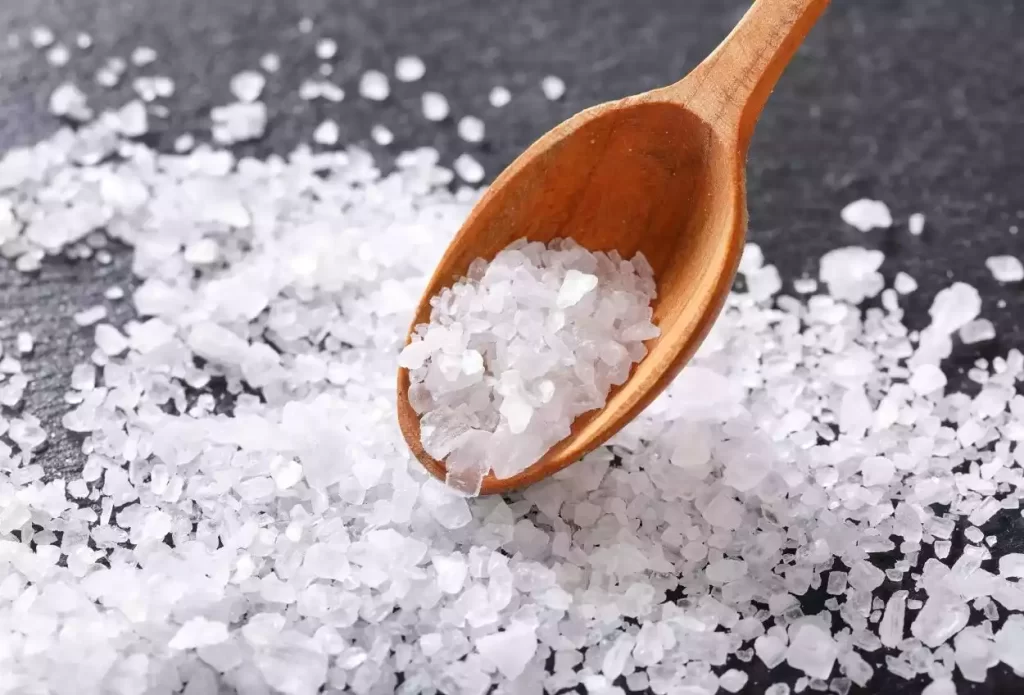
One of the key benefits of kosher salt is that it doesn’t contain any additives like iodine or anti-caking agents, which can sometimes affect the taste of the food. This makes it a popular choice for brining meats, as it dissolves easily and imparts a clean, pure saltiness to the meat. It’s also used in baking, especially for making bread where the larger grains can help control the fermentation process.
In summary, kosher salt is a type of salt with larger, coarser grains and no additives. It’s commonly used in cooking and has versatile applications in the kitchen, from seasoning dishes to brining and baking.
What is Table salt?
Table salt, often simply referred to as “salt,” is a common and essential seasoning in our daily lives. It’s a white crystalline substance that enhances the flavor of our food. Salt is primarily composed of two elements: sodium and chlorine, with the chemical name sodium chloride (NaCl). It’s typically mined from salt deposits or obtained through the evaporation of seawater.
Salt serves various purposes, including enhancing the taste of our meals, preserving food, and even softening hard water. We sprinkle it on our dishes, and use it in cooking, and it’s a fundamental component of many recipes. In addition to its culinary uses, salt has historical significance and has been used as a form of currency and in various cultural and religious rituals.
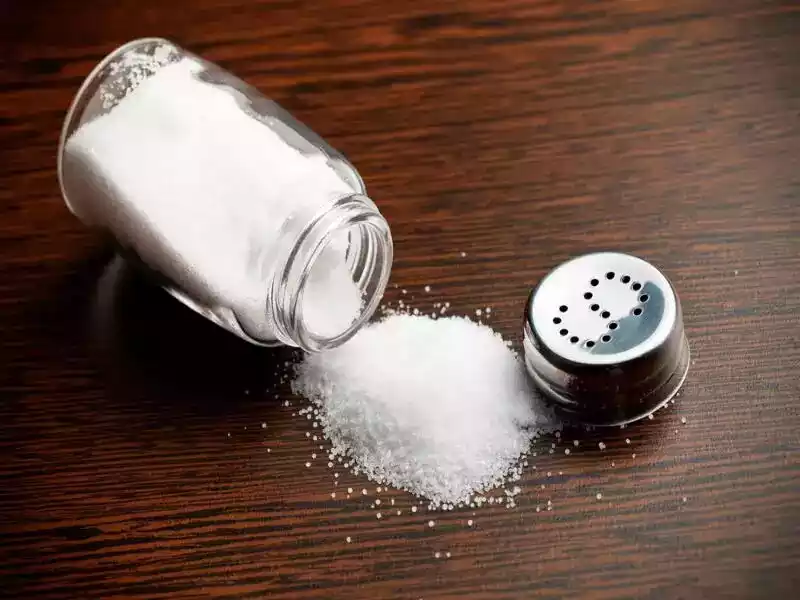
Table salt is a basic, everyday substance that adds flavor and versatility to our food, making it an indispensable part of our culinary experiences.
Key comparison of Kosher Salt and Table Salt
Here’s a straightforward comparison chart highlighting the main differences between kosher salt and table salt:
| Aspect | Kosher Salt | Table Salt |
|---|---|---|
| Crystal Size | Larger, coarse grains | Smaller, fine grains |
| Texture | Less dense, flakier | Dense and fine |
| Additive | Typically none | Often contains iodine |
| Usage | Ideal for cooking, especially in recipes that call for specific measurements | General-purpose seasoning, ideal for table use |
| Salting Measure | Due to larger grains, a pinch of kosher salt contains less salt than a pinch of table salt | Smaller grains result in more salt per pinch |
| Dissolving | Slower to dissolve in liquid | Quickly dissolves |
| Common Applications | Ideal for dry brining, curing meats, and rimming cocktail glasses | Most commonly used for seasoning food during cooking or at the table |
This simple chart provides a quick reference for understanding the basic distinctions between kosher salt and table salt.
Texture and flavor
Let’s delve into the texture and flavor of kosher salt and table salt in more detail:
Texture:
Kosher Salt:
- Kosher salt typically has larger and coarser crystals with irregular shapes.
- The larger crystals give it a flaky or coarse texture.
- It can vary in density, but it’s generally less dense than table salt due to its larger grains.
Table Salt:
- Table salt is finely ground, resulting in very small, uniform grains.
- It has a fine and powdery texture.
- It is denser compared to kosher salt, as the fine grains pack tightly together.
Flavor:
Kosher Salt:
- Kosher salt is known for its mild, clean, and pure taste.
- It lacks the iodine and anti-caking agents that are often added to table salt, which can sometimes impart a slightly bitter or metallic taste to table salt.
- Its mild flavor allows it to enhance the natural flavors of foods without overwhelming them.
Table Salt:
- Table salt has a sharper, saltier taste due to the smaller grain size, which allows it to dissolve quickly on the taste buds.
- It often contains added iodine and anti-caking agents, which can give it a slightly different taste compared to kosher salt.
The differences in texture and flavor make kosher salt a popular choice for many culinary applications, especially when a milder and cleaner taste is desired. The coarser texture of kosher salt can also be advantageous when it comes to certain cooking techniques and applications, such as seasoning meats or certain baking recipes. On the other hand, the fine texture of table salt and its quick dissolution make it a practical choice for precise measurements in recipes that specify volume-based salt quantities.
Uses in the kitchen
Both kosher salt and table salt have various uses in the kitchen, and their distinct characteristics make them suitable for different culinary applications.
Here are some common uses for each type of salt:
Kosher Salt:
- Seasoning Meats: Kosher salt is often used to season meats before cooking. Its larger crystals help draw out moisture from the meat’s surface, which enhances flavor and texture. This process is sometimes called “dry brining.”
- Kosher Meats: Kosher salt is used in the koshering process for meats according to Jewish dietary laws. This involves salting meat to remove blood.
- General Seasoning: Kosher salt can be used as a general-purpose salt for seasoning a wide range of dishes, including vegetables, soups, stews, and salads.
- Baking: Some bakers prefer to use kosher salt in baking recipes, particularly for bread and cookies, because it’s easy to distribute evenly in the dough, and its mild flavor doesn’t overpower the baked goods.
Table Salt:
- General Seasoning: Table salt is the most common type of salt used for general seasoning in cooking. It’s convenient for most recipes, especially when precise measurements are required.
- Baking: Table salt is often used in baking recipes that specify precise measurements by volume. It dissolves quickly and evenly in batters and dough.
- Salting Water: It’s commonly used to season boiling water for cooking pasta, rice, and vegetables. The fine grains dissolve rapidly in the water.
- Table Setting: Table salt is typically found on dining tables and is used to sprinkle on prepared dishes as a condiment.
It’s important to note that when substituting one type of salt for another in a recipe, you should consider the differences in saltiness and measuring techniques. Table salt is typically denser than kosher salt, so if a recipe specifies a particular volume measurement, you may need to adjust the amount used. Additionally, kosher salt is usually measured by weight (grams or ounces) when precision is crucial. The choice between kosher salt and table salt depends on the specific recipe and the desired flavor and texture in the final dish.
Health considerations
When it comes to health considerations, the choice between kosher salt and table salt is not just about taste and culinary application; it can also impact your overall health.
Here are some health considerations to keep in mind when using these types of salt:
Iodine Content:
- Table Salt: Most table salt is iodized, which means it contains added iodine. Iodine is an essential nutrient that plays a crucial role in thyroid function and preventing iodine deficiency disorders, such as goiter. Using iodized table salt can help ensure you get an adequate intake of iodine.
- Kosher Salt: Kosher salt is typically not iodized, which means it does not provide the iodine that table salt does. If you primarily use kosher salt and don’t get iodine from other dietary sources (such as seafood or iodized salt in processed foods), you may need to ensure you’re meeting your iodine requirements through your diet.
Sodium Content:
- Both kosher salt and table salt are primarily composed of sodium chloride, which contributes to your daily sodium intake. Excessive sodium consumption is associated with high blood pressure and other health concerns, so it’s important to use salt in moderation, regardless of the type.
Measuring and Control:
- Kosher salt, due to its larger crystal size, is often measured by weight rather than volume. This can be advantageous for precision in some culinary applications, but it also means you may need to be cautious about overusing it in recipes that specify table salt by volume.
- Table salt’s fine grains make it easier to measure and control, which can be beneficial when following recipes that call for precise measurements.
Individual Dietary Needs:
- Some individuals may have specific dietary restrictions or health conditions that require careful monitoring of salt intake. In such cases, it’s essential to consult with a healthcare professional or dietitian to determine the most suitable salt for your needs.
Overall, when it comes to health considerations, it’s important to use salt in moderation, regardless of the type you choose. Whether you prefer kosher salt or table salt, being mindful of your salt intake and incorporating a balanced diet with a variety of nutrients is key to maintaining good health. If you have specific dietary concerns or conditions, it’s advisable to seek guidance from a healthcare provider or registered dietitian to make informed choices regarding salt and other dietary components.
Prices and availability of Kosher Salt and Table Salt
The prices and availability of both kosher salt and table salt can vary based on several factors, including your location, the brand, the quantity, and the type of salt.
Here are some general considerations regarding the prices and availability of these salts:
Kosher Salt:
- Price Range: The price of kosher salt can vary widely, but it’s typically more expensive per pound or kilogram compared to table salt. The cost can range from a few dollars per pound to several dollars per pound, depending on the brand and packaging.
- Brands: There are various brands that produce kosher salt, including Diamond Crystal, Morton, and others. The price may vary between these brands.
- Packaging: Kosher salt is commonly available in boxes or canisters, but you can also find it in larger bulk quantities, which can be more cost-effective if you use it frequently.
- Availability: Kosher salt is widely available in most grocery stores and supermarkets. It can also be found in specialty food stores, gourmet shops, and online retailers, making it accessible to consumers in many regions.
Table Salt:
- Price Range: Table salt is generally more affordable than kosher salt, and the price is often lower per pound or kilogram. It can range from a few cents to a few dollars per pound, depending on the brand and packaging.
- Brands: Numerous brands produce table salt, including common ones like Morton, Diamond Crystal, and various store brands. The price may vary between brands.
- Packaging: Table salt is available in various packaging options, including canisters, boxes, bags, and bulk containers. The price may vary based on the packaging and quantity.
- Availability: Table salt is highly accessible and is commonly found in grocery stores, supermarkets, convenience stores, and most food retailers. It’s a staple ingredient and is widely available worldwide.
Availability and prices can be influenced by local factors, market demand, and distribution channels. Additionally, you may find variations in prices and availability for specialty or gourmet salts, such as sea salt or Himalayan salt. When shopping for salt, it’s a good idea to compare prices and consider factors like quantity, quality, and brand to find the best option that suits your needs and budget. Online retailers also offer the convenience of purchasing various types of salt and comparing prices from different suppliers.
The conclusion of the article
the differences between Kosher salt and table salt extend beyond just their culinary applications. They offer distinct textures, flavors, and even health considerations, making them suitable for various cooking needs.
When it comes to selecting the right salt for your dishes, it’s essential to consider your specific preferences, the nature of your recipes, and any dietary requirements or health concerns. Understanding the pricing and availability of these salts is also a practical aspect of making informed choices for your kitchen.
Kosher salt, with its larger, flaky crystals and clean taste, is perfect for seasoning meats, while table salt’s fine texture and uniformity make it a convenient choice for precise measurements in baking and general seasoning.

